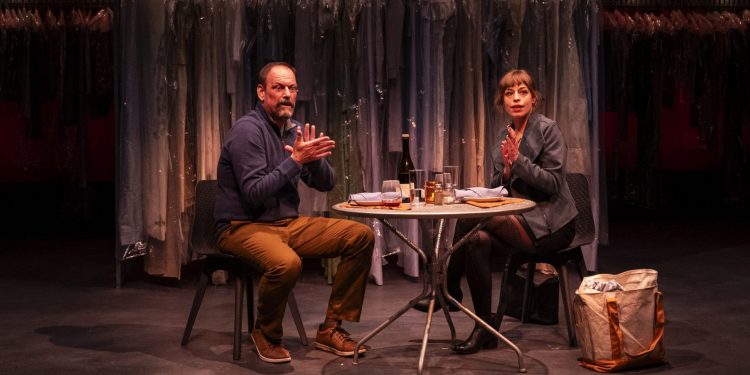By Rikki Lee Travolta
The automatic connection most people make to the name John Patrick Shanley is as the Academy Award-winning screenwriter of the 1987 film “Moonstruck.” That blockbuster starred Cher and Nicholas Cage and was nominated for a total of six Oscars, winning three – including Shanley’s.
However, that limited footnote of his resume only scratches the surface of a career that includes 23 plays, 10 films, and several notable television projects. Does everything he writes stick with all audiences? I doubt anyone could achieve that.
In truth, there are some Shanley titles I find brilliant and others that aren’t as appealing to my taste. And that’s what I think is so incredible about Shanley as a writer. He can write in diverse styles to appeal to different audiences.
At one end of the extreme, he wrote the looney Tom Hanks/Meg Ryan romantic comedy “Joe Versus the Vacano”. Appealing to serious theatrical audiences, he scripted the powerful Tony Award and Pulitzer Prizing drama “Doubt” – which he adapted for the screen and directed resulting in five Academy Award nominations. Showing off the extent of how he can bend his talents to any genre, he even penned the action sci-fi script for “Congo” based on a Michael Crichton book.
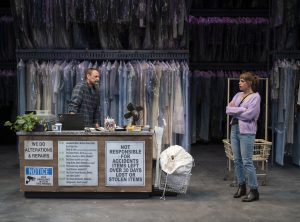
Bearing all this in mind, I wasn’t sure what to expect walking into the Northlight Theatre’s production of Shanley’s newest play “Brooklyn Laundry”. This production, directed by the theatre company’s artistic director B.J. Jones, is part of a rolling world premiere of mountings around the country that started in February with an Off-Broadway production Shanley directed himself.
Sometimes in not knowing what to expect, you are most open to truly experiencing a play. You don’t walk in with preconceived ideas of what it should be or could be.
As a script, “Brooklyn Laundry” is one of Shanley’s best. Although there is romance and there is comedy, it isn’t a romantic comedy. And while there is heavy drama in addition to truly funny comedy, it isn’t a dramedy. It is all of these things and none of these things. There is also the element of tragedy and triumph.
That is what is so fascinating to watch with “Brooklyn Laundry” – it shifts genres rather than blending them. The bus takes you all over the map, but they are all interesting destinations. And the conclusion brings it all home together with a beautifully satisfying end that is perfect in its imperfection.
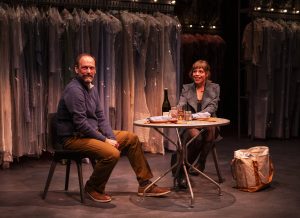
On the surface “Brooklyn Laundry” explores the not all-the-way unlikely romance between a young New York woman who hasn’t found her path and an older laundry owner. It’s not a full-scale May/December romance, she’s on the older side of young and he’s on the younger side of old. They are both at an age where the subject of children is a logical topic when they go out.
Fran lives in a studio apartment in Brooklyn. She works an office job that isn’t worth describing more than that. It’s not the fulfillment of career ambition, but a job to pay the rent.
She’s recently gone through a tough breakup. Not so much tough that he’s gone, but tough that she is alone again. She worries she isn’t capable of a forever relationship, or at least it might not be destined for her – and that is a true sense of anxiety for her. It is anxiety that manifests itself in various ways. One way is lashing out at strangers – such as the owner of the local drop-off laundry store.
Owen is the owner of that laundry. He doesn’t normally work in the shop himself, in fact owning three such establishments. But he happens to be covering the Brooklyn store when Fran arrives with a little laundry and a lot of attitude.
Somehow Fran’s gloominess and Owen’s off-beat, good-natured humor break through the cracks in each other’s walls. And while it’s not love at first sight, by the end of their ping-ponging conversation there is enough of a spark that they make plans for a date when Fran gets back from a trip out of town.
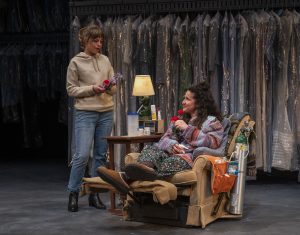
What Owen doesn’t know is why Fran is going out of town. It’s to visit her sister Trish who is dying of cancer. She’s close enough to the end that she has a hospice nurse. Hospice care is typically provided to make a terminal patient comfortable in their last days.
Fran has another sister, Susie. The oldest child, Susie is the caretaker of the family. She is the responsible one – the one with a good professional career and a stable husband. It is simply assumed by all that once the time comes and Trish passes, Susie will take care of everything. That’s her role in the family.
Trish, the wild one with romantic ideals, advises Fran to pursue a new direction. To take on a new mindset. To let herself dream and pursue those dreams. To put herself first. To stop being the one who can’t make decisions.
Susie, the responsible one, has a far different view of how Fran should take on the future. Susie’s vision for Fran is one based on putting herself second and the other members of her family first.
All of this, of course, affects Fran’s potential relationship with Owen.

In the central relationship, Steppenwolf graduate and Jeff Award winner Cassidy Slaughter-Mason bravely takes on the complex character of Fran opposite Mark Montgomery as the older, more jovial Owen. Montgomery is himself a Jeff nominee whose resume extends to Broadway.
Slaughter-Mason has to cover a lot of territory as Fran. She is the glue that holds the show together. She is the only one to share the stage with each of the other performers. They each have a scene or two to add their flavor to the story, she is in all of them and responsible for making sure the final meal is the perfect mix of all those flavors.
Displaying incredible versatility and authenticity, Slaughter-Mason makes a damaged person a beautiful triumph even in the face of a mountain of challenges. You can see it all in her eyes – the anger, the happiness, the confusion, the hope, the despair, and the determination. Every decision is arrived at, not just there because it’s in the script. It is a masterful performance.
Owen is an interesting character because it calls for a type of actor who doesn’t always get to play the romantic lead. He’s a bit older. And although a thoughtful and tender man, he doesn’t believe in romance because it is the creation of a false reality. He wants to be realistic that you have to order off the menu. Wanting chicken in a restaurant that doesn’t serve chicken isn’t realistic.
Montgomery is a very talented actor. He creates an enjoyable character and demonstrates the ability to show different emotions.
Marika Mashburn is truly incredible as the dying sister Trish. Confined to a chair for her entire time on stage, Mashburn makes use of every tool she has at her disposal to make Trish real. Her eyes show the effects of being medicated. As her lips smack, you feel her persistent dry mouth. When she talks of the father of her children, you see the sincere love. And when she gives advice to Fran, you feel it from the heart.

Sandra Delgado is a firecracker as eldest sister Susie. She struts the stage as a woman in command. Where Fran is rudderless and Trish’s boat follows a very leisurely map, Susie is all about getting from point A to point B in the quickest and most efficient way possible. She is used to getting her way, and what she wants for Fran is in conflict with what Fran wants for herself.
Along this journey, the playwright introduces the opportunity for you to consider what the definition of a woman is. He also asks the audience to consider what the definition of a man is.
By definition, it’s not a question of what it says in the dictionary. Rather, what are the qualities that make one a true woman or a true man? Specifically, what do you do when faced with taking the easy path alone, or the hard path as a part of something bigger than yourself?
The conclusion of “Brooklyn Laundry” provides total emotional fulfillment. After dragging my emotions through all sorts of turns, the playwright, cast, and director made my heart swell and a tear of happiness crawl down my cheek at the finale.
For North Shore Center for the Performing Arts’ expansive-ceilinged space, director Jones and set designer Jeffrey Kmiec have gone with a static set based on a dry cleaner motif. The result is a very impressive structure that takes the laundry theme and stretches it skyward. The number of clothes on display to achieve the look is extraordinary.
The suggestive set allows lighting designer JR Lederie to explore interesting options to show scene changes in various locations. An overhead fluorescent light adds an authentic retail feel to the scenes set in the store. Strings of lights a few feet above the actors help change the setting to an outdoor restaurant at another point.
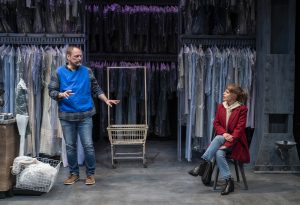
Costume design by Izumi Inaba is well individualized to each character, helping to define them. The little things do count. Lindsay Jones also shares in the credit for an overall incredible show, providing original music and sound design. Stage manager Katie Klemme keeps all cylinders firing from start to end.
Northlight Theatre has struck gold with “Brooklyn Laundry”. It features incredible actors and a marvelous script in the hands of a master director. Strap in and get ready for a journey that will leave you cheering for the strength of the human spirit. Just because you can stand on your own, two are stronger than one. This world premiere is a triumph!
“Brooklyn Laundry” plays through May 12 at North Shore Center for the Performing Arts located at 9501 Skokie Blvd. in Skokie. Performances are Wednesdays through Sundays, with evening performances Wednesday through Saturday. Matinees are on Wednesdays, Saturdays, and Sundays.
For tickets and a full schedule of performance dates visit www.Northlight.org or call the Box Office at (847) 673-6300.
Photo Credit Michael Brosilow
For more reviews visit: Theatre in Chicago – your source for What’s on Stage in the Chicago Area.


